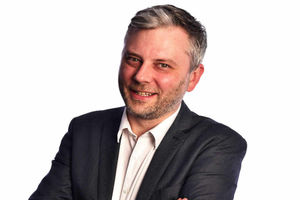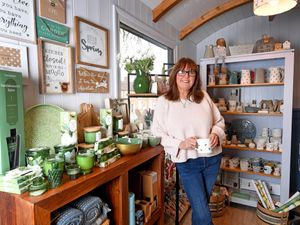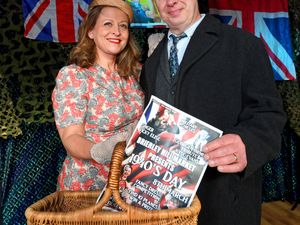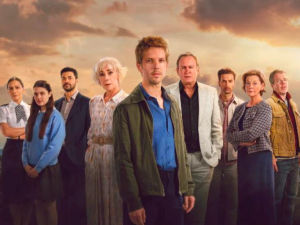Pete Madeley: Breaking non-news! Why is drivel hitting the headlines?
A few days ago I read a news article that shocked me to my very core.

Now, I'm fully aware that the world is a pretty scary place at the moment, leading doom-mongers to speculate on the forthcoming collapse of civilisation as we know it.
There's the ever-increasing threat of terrorism, half of the UK is panicking about Brexit, while half the world is bemoaning Donald Trump's entry into the White House.
Dictators are running amok across Africa and the Middle East, and North Korea appears to be ready to launch a nuclear bomb (I'm reliably informed that scientists there are grafting night and day trying to work out how to fit a warhead on to a missile).
Yet a bigger crisis is looming after it emerged that the world is in the grip of a courgette shortage.
And it could last for FOUR MONTHS.
Vegetable experts (I'm picturing Gregg from MasterChef) say that unusually cold and wet weather in Spain has decimated reserves, leading to empty supermarket shelves and, get this, waiting lists with some suppliers.
It means that certain areas of the country are facing the daunting prospect of no courgettes until May.
For the zero per cent of people who can't get through the week without eating this particular veg it must be a deeply worrying time.
The rest of us can buy cauliflower, carrots, sprouts or peas instead.
For any true courgette obsessives out there, I apologise for being facetious.
However, for me this is just one example of the hundreds of non-news stories that we are bombarded with every week.
It clutters our Twitter feeds, pads out the back ends of newspapers and serves as click-bait on websites.
I must point out that this is a very different beast from fake news, which is basically complete nonsense that is frequently used to push specific political agendas.
But fake news at least has the capacity to amuse at times.
Donald Trump was not born in Pakistan and Hillary Clinton has not engaged in cannibalism, contrary to reports from numerous international news agencies.
A Chinese zoo never had any intention of naming a gorilla Harambe McHarambeface, and a Malaysian man did not marry a snake.
Sadly, beaches in Cornwall are not set to become all year round holiday destinations thanks to the installation of under-sand heating.
Part of the journalists lot is to try and sift out the real news from the guff, which is why I won't be running a story handed to me this week claiming that Ronnie Biggs, the late Great Train Robber, is alive and well and residing in a local mental institution.
Non-news has that all-important element of truth which is missing from fake news – or 'post-truth', to coin the Oxford Dictionaries 2016 Word of the Year nominee.
But there is no doubt it can have a damaging effect on the mental state of the reader, prompting at best disinterest, and at worst blind fury at having wasted precious seconds reading such drivel.
Here's another example from this past week.
'This is the West Midlands favourite drug after cannabis', screamed the please-read-me headline.
I did, and found out that as far as the region's druggies are concerned, cocaine is number two on the narco list.
The reasoning behind the claim is that in 2015/16 police seized a total of 2kg of cocaine off the streets of the West Midlands – or one dose per 71 people living in the region, as the publication helpfully calculated.
Far be it from me to belittle the serious nature of drug abuse, but 2kg does not sound like a whole lot of cocaine over the course of a year, particularly when you consider 3,530kg of the stuff was seized by the UK Border Force over the same period.
I imagine that some Hollywood A-listers would have got through 2kg in an average weekend, and still been scouring the streets for more by the early hours of Monday morning.
Eighteen years ago to this very day the United States Coast Guard seized the then biggest haul of drugs in American history when intercepting a ship with 4,300kg of cocaine on board.
Now that must have been some story and would rightly have made a few headlines back in 1999.
At the current rate, it will take another 2,150 years before the West Midlands reaches such heady heights.
Now I am not about to fall into the trap of dismissing a story simply because it does not interest me.
According to reports there was a 'cuteness overload' when Holly Willoughby (pictured left) and Phillip Schofield posed with a bunch of kittens on This Morning last week.
I couldn't care less, but fully understand that some people enjoy seeing celebrities canoodling with pets. (Note: This comes just four months after The Mirror reported Phillip had fallen in love with an orphan puppy on the same show).
In the same vein the progress of Ferne McCann's non-surgical bum treatment is not a story I am following with any great zest, but even the biggest cynic can appreciate there is a market for tittle-tattle.
Non-news is not a new phenomenon.
Picture-led stories about the fact that it snowed yesterday, or that the sun might come out later in the week are staples of the press.
But we could all do without having to trawl through reports about cars being parked too closely together in Frome, or crackpot scientists claiming tea can cure cancer (that's another pair of corkers from recent weeks).
Forget fake news, the world would be a far better place if the barrage of non-news became a little less deafening.




